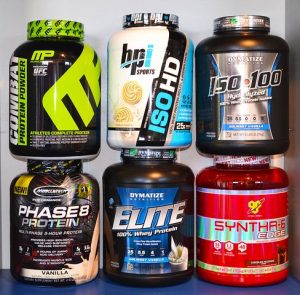
When you’re trying to lose weight, getting sufficient amino acids and protein can get the scale moving in the direction you want it to.
When you hear statistics like “90% of Americans Have a Nutrient Deficiency,” you probably place yourself in the nutritionally complete 10%, especially if you take your vitamins and do a fairly reasonable job at watching what you eat. However, if you are fatigued, chronically lack energy, frequently catch colds and/or have a hard time losing weight, maybe you should think again. Those specific symptoms are signs of amino acid deficiency. Plus, if you don’t get enough aminos, you won’t be able to sufficiently absorb nutrients from that multivitamin and mineral supplement you take.
Additionally, since amino acids are the essential elements that make up protein, if you’re short on aminos, you’re likely not getting enough protein, either. If you’ve been trying to lose weight and nothing seems to work, add amino acids and more protein to your diet. Those elements could be what’s been missing the whole time.
Protein and Weight Loss

Eating lean protein lets you discount 20 – 30% of the protein calories you eat. Your body uses up that much just to digest it.
Protein is essential to good nutrition and, if you think about it, protein for weight loss is good common sense. One reason is that you burn more calories digesting protein than any other food. According to Precision Nutrition, 20 to 30 percent of the protein calories you eat are spent on processing it so, right from the start, protein boosts your burn. Next, when you eat protein as part of a weight loss plan that includes building muscle, protein helps build lean muscle mass which increases the amount of fat and calories your body burns.
The Studies
Scientific studies are what really give legs to the protein for weight loss premise because actual results are hard to argue with. One study published in the Journal of Nutrition showed that increasing protein helped stabilize glucose and insulin that, in turn, enhanced weight loss. Another study published in the Annual Review of Nutrition showed that protein helped with weight loss by providing energy along with curbing the appetite. Yet more research published in the Nutrition Journal showed that supplementing whey protein and essential amino acids helped with weight loss during a restricted calorie diet. The protein and aminos working together allowed subjects to feel full on fewer calories and increased their bodies’ ability to absorb nutrients, giving them more energy.
Research discussed on Web MD indicates that whey protein is most effective for helping to reduce body fat. The study focused on two groups that were given protein meal replacements, but one group’s protein was specifically whey and included essential amino acids. Both groups successfully lost weight, but the whey/aminos group lost more fat than the other group.
Am I Getting Enough?
So how do you know if you’re getting “enough” protein? The CDC has it all neatly broken down into dietary needs based on age and sex, with adult women needing about 46 grams of protein each day and adult men requiring 56 grams per day. However, your lifestyle and your body weight play a part in your protein needs. That means, if you’re working out as part of your weight loss plan, you’ll need more than the bare minimum the CDC recommends. Health magazine has a more accurate way to figure protein needs based on your activity level. Start with your body weight in pounds and then multiply it by a certain number based on how active you are:
- sedentary, little to no exercise, X by .4
- active, regularly work out, X by .6
- athletic, competitive athletes, X by .75
The answer is the number of grams of protein you need each day.
Once you figure out how much protein you should be getting, don’t increase your intake all at once. If your body isn’t used to processing a lot of protein, suddenly flooding your system with it can be hard on your kidneys. Instead, gradually increase your protein by about 5 grams at a time once or twice a week until you’re at the level you should be.
Aminos’ Role
There are over 20 amino acids, and each one plays a part in nutrition. Some are specifically tied to functions that affect weight including metabolism. The branch-chained amino acids (BCAAs), for example, typically show up in weight loss supplements because they not only support energy levels, but the specific BCAA leucine has numerous effects on the metabolism, including increasing calorie burn, telling your body to burn fat while keeping muscle, and helping curb your appetite. One study published in the Nutrition Journal even found that supplementing with leucine resulted in a higher loss of body fat than dieting alone.
Livestrong recommends other aminos essential for weight loss goals including:
- carnitine — which tells your body to use fat for energy instead of storing it
- tryptophan — which helps stabilize hormone and insulin levels, stabilizes blood glucose levels, and encourages your body to produce growth hormone by promoting restorative sleep
- tyrosine — which speeds up your metabolism for fat burning and enhances other aminos’ appetite suppressant effects
As if helping you to lose weight weren’t enough, an article in the May 2015 issue of “First for Women” reveals that getting enough protein and amino acids in your diet will also improve your mood and decrease depression, give you more energy, help you concentrate, and enhance digestion of all the food you eat. Even better, Health Central says that amino acid and protein-rich foods like turkey and soy products will help increase your skin’s elasticity. So consider younger looking skin the cherry on top of the amino acid/protein cake.


